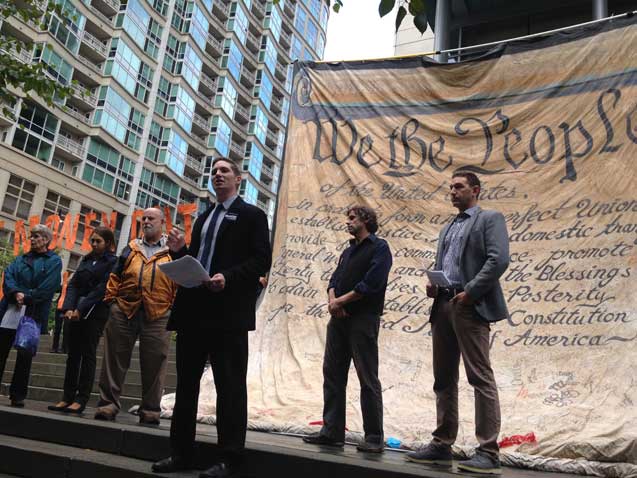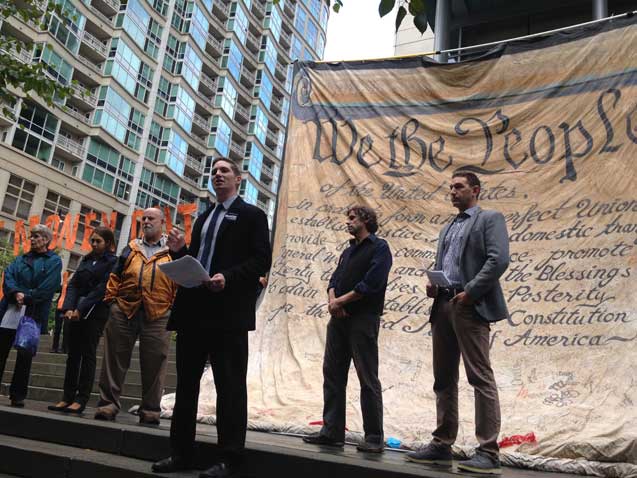
 McCutcheon Event Photo (Left to Right): Dorothy Van Soest, Washington Coalition to Amend the Constitution; Negheen Kamkar, Editor in Chief of the UW Undergrad Law Review; Sen. Adam Kline, Chris Esh, WashPIRG (Speaking), Bill Moyer, Backbone Campaign; Jake Faleschini, Fair Elections Seattle. Event took place October 8, 2013 outside the US District Court in Downtown Seattle. (Photo: Washington PIRG)
McCutcheon Event Photo (Left to Right): Dorothy Van Soest, Washington Coalition to Amend the Constitution; Negheen Kamkar, Editor in Chief of the UW Undergrad Law Review; Sen. Adam Kline, Chris Esh, WashPIRG (Speaking), Bill Moyer, Backbone Campaign; Jake Faleschini, Fair Elections Seattle. Event took place October 8, 2013 outside the US District Court in Downtown Seattle. (Photo: Washington PIRG)
While the US Supreme Court mulls lifting overall limits to campaign contributions in the McCutcheon case, Seattle citizens go to the polls Tuesday over reforming their elections with publicly funded campaigns that empower small donors.
On October 8, 2013, the Supreme Court heard a challenge to the overall limits on what individuals can donate to all candidates and parties – the aggregate limits – in the case of McCutcheon v. FEC. On that day, citizen groups and elected officials came together across the country to call on the court to maintain those limits to preserve the voice of ordinary Americans in our democracy.
The fact is contribution limits are already too high. Candidates for office are over-reliant on donors who can give the most, and current federal limits are far higher than what the average American can afford to give. As evidence of this, one need not look further than the 2012 elections, in which House candidates raised 55 percent of their individual contributions in chunks of $1,000 or more from just 183,654 donors, and Senate candidates raked in 64 percent in contributions of that size from about 133,000 individuals.
Striking the aggregate limits would make that problem significantly worse. These limits work together with the base limits to ensure that a small set of donors cannot disproportionately flood the elections. If they are lifted, a single donor could contribute up to $3.6 million to all candidates and PACs within a given party. Only a small handful of individuals come even close to the aggregate limit. In 2012 only 1,219 people came within 10 percent of the $117,000 limit, which is not at all surprising when you consider that this is more than twice what the average American household earns in a year. Super PACs offer a clear example of what happens when limits are lifted – huge donors accounted for the vast majority of the funds, with just a handful balancing out the gifts of millions of small donors. In fact, just 32 super PAC donors matched every single small donor to Obama and Romney combined – drowning out the contributions of over 3.7 million individuals.
What a ruling for McCutcheon would do is allow special interests to exert an unprecedented level of control over our democracy. And when ordinary Americans are further squeezed out of the process, it will become harder for us to leverage our people-power to protect the environment, working families and civil rights.
The Silver Lining
The McCutcheon appeal, for all of its absurdity, highlights the greater problem with our campaign finance system – not just on the federal level, but at the state and local levels as well. And with a case that has drawn so much coverage, it gives democracy advocates an opportunity to begin planting the seeds for real change to our campaign finance system at all levels of government.
That change can begin in Seattle on Tuesday (Nov. 5). Then, Seattle voters have the opportunity to overcome big money by making campaign finance reforms that empower small donors and increase the clout average citizens have in our political process by having publicly-funded elections for city council candidates. The system uses simple incentives through public matching of small contributions; it sets campaign spending limits; and has strict standards for participating candidates. The results seen in other cities with similar reforms, like New York, demonstrate the highest levels of small donor participation and more competitive elections.
A supportive McCutcheon decision can either be taken as another devastating blow to our ability as ordinary citizens to advocate for change, or as the impetus for reclaiming our democracy from the clutches of special interests. We should take it as the latter, and Seattle offers a blueprint for how we can begin to strike back. It will be difficult, but it is a necessary fight if we consider the cost to ordinary citizens in a post-McCutcheon country.
Trump is silencing political dissent. We appeal for your support.
Progressive nonprofits are the latest target caught in Trump’s crosshairs. With the aim of eliminating political opposition, Trump and his sycophants are working to curb government funding, constrain private foundations, and even cut tax-exempt status from organizations he dislikes.
We’re concerned, because Truthout is not immune to such bad-faith attacks.
We can only resist Trump’s attacks by cultivating a strong base of support. The right-wing mediasphere is funded comfortably by billionaire owners and venture capitalist philanthropists. At Truthout, we have you.
Truthout has launched a fundraiser, and we must raise $31,000 in the next 4 days. Please take a meaningful action in the fight against authoritarianism: make a one-time or monthly donation to Truthout. If you have the means, please dig deep.